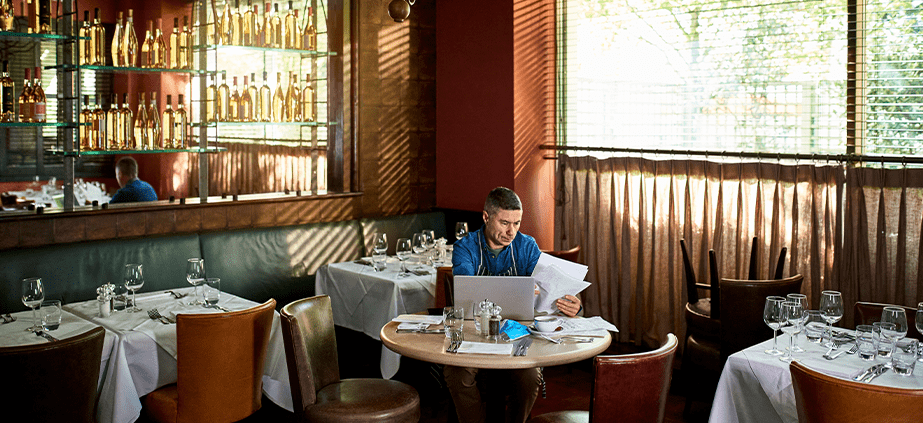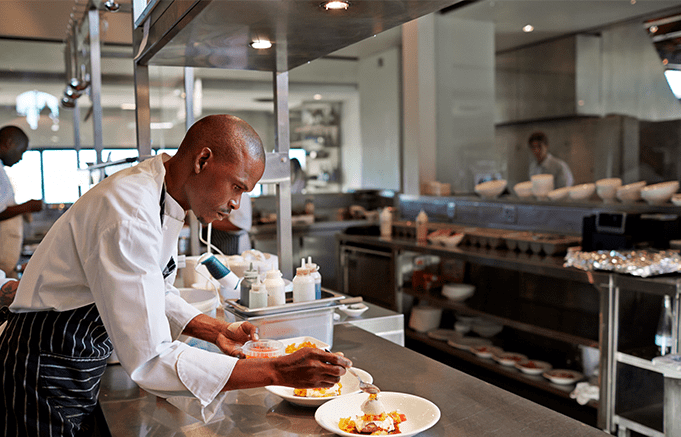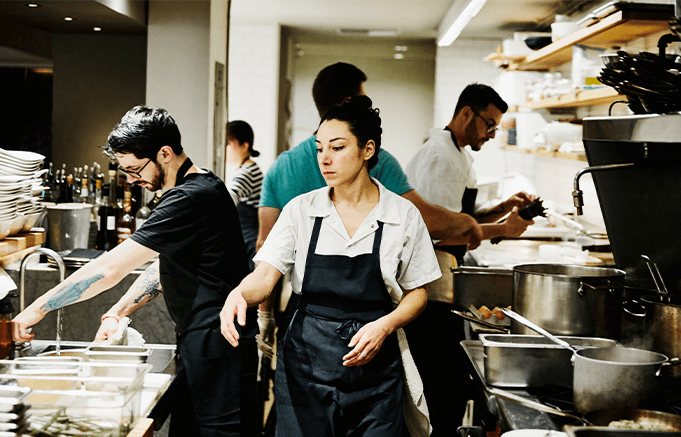Food entrepreneurship: how to get ahead

If you've been looking at culinary career paths, you will have probably considered the idea of starting your own food business. Being a culinary entrepreneur can be an exciting and rewarding career for people who want to work for themselves and decide what kind of company they want to run.
This is one of the most interesting things that you can do with a culinary degree. In this article, we'll go over what food entrepreneurship is, what kind of careers you can look at, and how to start your path on the right foot.
What is food entrepreneurship?
Food entrepreneurship refers to people setting up their own businesses within the world of food and cuisine. This could encompass a wide range of business types, from starting your own catering business to being a culinary entrepreneur in food delivery. It could focus on any type of cuisine imaginable. Pretty much any business that you want to start within the food industry will come under the umbrella of entrepreneurship. It can also include food businesses in the hospitality industry.
Types of food entrepreneurship
There are many types of entrepreneurship in the food industry, including:
- Restaurant entrepreneurship
- Food trucks
- Catering companies
- Fast-food outlets
- Delivery boxes or premade food Meal kits
- Food innovation in a specific field, such as spirits, sauces, ready meals, or snacks
- Cooking classes.
Of course, this is only a limited list. There are plenty of entrepreneurial food business ventures out there that you can use to get inspiration for your own idea.

Food entrepreneurship vs. traditional food businesses
While many types of food businesses have been around for a long time, there are some differences. With parts of the market dominated by major names, much of modern entrepreneurship is focused on smaller companies that focus on providing a different experience for their customers.
For example, this might be a restaurant that offers only vegan food or a brand of sauce that uses ingredients local to the area where it's made. Otherwise, the two are very similar, with the aim of building up good business growth from the first steps towards a successful future. Having an innovative idea for entrepreneurship can help ensure that you have a successful food business.
Why is this important to the food industry as a whole?
Entrepreneurs are vital for the food industry as they bring something new and exciting to the field. Food entrepreneurs help develop and push the boundaries of the culinary arts, which helps encourage customers to stay interested in restaurants or other food businesses. Many of these businesses also help promote sustainability in the food industry.
Career paths in food entrepreneurship
There are many paths that you can take in your entrepreneurial endeavors, and if you're unsure whether or not this type of career is right for you, there are some factors to consider.
Explanation of the various roles in food entrepreneurship
With the wide range of different businesses that you could start, there are varied roles you could end up taking on. Of course, all culinary entrepreneurs will likely have to do some of the same tasks at the start of their business, such as:
- Management
- Planning
- Research
- Development
- Financial management
- Marketing
- Market research
- Brand building
- Handling licensing requirements
If you feel that these roles don't suit you, why not look at building a partnership with someone who will help handle the business side of your idea?
Depending on the type of business plan you have, you could find yourself also doing tasks such as:
- Cooking
- Menu development
- Recipe development
- Teaching
Advantages of a career in food entrepreneurship
One of the main advantages of developing your own business is that you can pick what roles and tasks you take on, and which tasks you can find someone else to do. This means that you can focus on the parts of being a culinary entrepreneur that you enjoy.
Common challenges faced by food entrepreneurs
There are several challenges in starting your own food business. These include:
- Making sure your cuisine meets food regulations and food safety standards
- Tracking customer behavior to ensure a profit
- Finding suitable funding options
- Following sound financial planning to avoid issues from quiet seasons
- Working long hours
- Constant innovation
- Finding your unique selling point
Building startup food businesses can be a lot of work. Despite these challenges, there are plenty of food entrepreneurship success stories you can study, so it's very achievable to do well with your own food business.
Skills and qualities needed in food entrepreneurship
If you want to be successful in food entrepreneurship, you will need to have a good mix of culinary skills and business skills. One of the best ways to get this is to look at courses that offer training in both of these areas, as culinary program enrollment will help you get your ideas off the ground as well as teach you every contemporary cooking technique you will need to offer amazing food to your customers. As well as having a good education background, you will need attributes such as:
- Good work ethic
- Organizational skills
- Time management
- Creativity
- Determination
World-class degrees that deliver culinary expertise and business acumen
At École Ducasse, we focus on exceptional food skills combined with the astute business insights you need to develop a venture of your own

Starting a food entrepreneurial venture
There are some very important factors you should think about before planning your own food business.
Key considerations before starting
Some of the main things you should consider before starting..
- Building your professional network: It's very important to have contacts who can give you tips on finding the right suppliers, assist with marketing, or help you develop your ideas. Mentorship and networking will help your business. It's also worth joining a food entrepreneurship community to get support from other people.
- Staying current with trends and technology: Food trends change all the time, and you need to make sure that your idea is something that will be well received, rather than something that is already out of date.
- Getting valuable hands-on experience: Hands-on experience running a kitchen or in restaurant management can give you great skills for your own business, from sales techniques and marketing strategy to supply management and customer engagement.
Steps involved in starting an entrepreneurial food venture
If you're thinking of making your own food business, the basic steps are:
- Come up with your culinary idea
- Write a business plan
- Seek out consultancy
- Find suitable funding
- Build your business
Building your skills for food entrepreneurship
It can seem daunting to start your own business, especially if you're worried that you might lack some of the skills required. However, it's easy to follow the right path and get these skills through proper study, research and training.
The importance of formal training in the culinary arts
Having a formal culinary arts education is fundamental when it comes to building your culinary business. Getting proper training as a professional chef can help make sure that you are proficient in the technical side of cooking, which can help you develop your ideas and come up with good business suggestions. Plus, if you study somewhere like our culinary school in France, you will often find that the course you study and the people you meet can inspire you when it comes to developing great business ideas.
Intensive culinary arts diploma for career changers or school leavers
Combining practical culinary arts and immersive study modules, this nine-month course gives you the platform to make your food entrepreneurship dreams a reality
Understanding the different types of culinary education courses
It is always worth making sure that the culinary courses you pick cover the right areas for you and your business. Training as a professional chef is different from training in other areas of the culinary arts.
As a food entrepreneur, you should also pick a course that includes entrepreneurship studies to help you build your business. If you are unsure how to get into culinary school, you should rest assured that there are many courses for career changers and school leavers.
Other things to study
As well as the culinary arts, you could also study additional subjects, such as:
- Marketing, including social media marketing and niche marketing
- Technology in the food industry
- Financial planning

Food entrepreneurship: summary
Starting your own food business can be exciting and it opens up a different way of working. Whether you have just left school or have worked as a pastry chef for years, you can benefit from learning about business and improving your culinary skills to help you run your own food entrepreneurship.
Of course, running your own business can be a challenge, but it allows you to work in a way you want to, and there are many success stories that show how fulfilling it can be to become a food entrepreneur. Getting a culinary degree through École Ducasse can help set you on your path to building your own successful culinary business.


